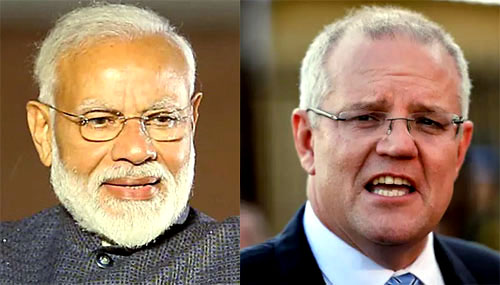by WorldTribune Staff, May 26, 2019
The recent elections in India and Australia show that once voters get a taste of conservative nationalism, “they tend to like it,” columnist James Pinkerton wrote for Breitbart News on May 25.
“They like, for example, the idea that a democratically-elected government can seek to uphold traditional values, not erode them. They appreciate, and will vote for, public officials who love their country and its people. By the same token, regular folks don’t like leaders who bad-mouth the country and go looking around the world for people they like better,” wrote Pinkerton, a White House official in both the Reagan and George H.W. Bush administrations.

In India’s May 23 election, Prime Minister Narendra Modi’s Bharatiya Janata Party (BJP) won re-election with 304 seats in the 543-member parliament, or Lok Sabha. The second-place party won just 51 seats.
The Washington Post headline tells the tale: “India’s Modi wins resounding election victory with potent appeal to nationalism.”
On the night of his victory, always sticking to nationalist themes, Modi said, “If someone has won today, it’s the country.”
In the wake of conservative Prime Minister Scott Morrison’s against-all-0dds victory in Australia, Pinkerton noted that Blomberg Opinion ran a piece under the headline: “The right-wing populist playbook keeps winning.”
“And what exactly did the Aussie conservative nationalists do? They attacked their opponents for being liberal globalists, which, of course, they were. See? Politics isn’t so hard. If the majority is conservative and nationalist, the thing to do is invoke that majority, stay true to it, campaign on it—and then you’ll win,” Pinkerton wrote.
The leftist media also had its preferred spin after Modi’s triumph in India.
“Speaking, as always, for liberal globalism, Bloomberg chastised, ‘Heavy-handed appeals to nationalism that rally the masses to his side.’ And the like-mindedly liberal BBC explained, ‘The vote had been widely viewed as a referendum on the prime minister’s Hindu nationalist politics.’ ”
The Modi government” has toughened up on immigration, including movement from another neighboring Muslim country, Bangladesh,” Pinkerton noted. “Modi defines this effort as the normal maintenance of homeland security, while the critics have labeled it — you knew this was coming — a ‘Muslim ban.’ ”
In an article “aimed, no doubt, at getting clicks from its left-leaning readership, the BBC slapped on the headline ‘Echoes of Trump in Modi’s border politics,’ ” Pinkerton noted.
Trump posted the following tweet after Modi’s win: “Congratulations to Prime Minister @NarendraModi and his BJP party on their BIG election victory! Great things are in store for the US-India partnership with the return of PM Modi at the helm. I look forward to continuing our important work together!”
Australia’s Morrison tweeted: “Congratulations @narendramodi on your historic re-election as Prime Minister of India. Australia and India enjoy a strong, vibrant and strategic partnership, and our India Economic Strategy will take our ties to a new level. I look forward to meeting again soon.”
Pinkerton pointed to “a slew of conservative nationalists — including Brazil’s Jair Bolsonaro, Hungary’s Viktor Orbán, and Israel’s Bibi Netanyahu — who have become the democratically elected leaders of their respective countries. Another important figure in this worldwide movement is Italy’s Matteo Salvini; he’s the deputy prime minister, albeit not the head of state.”
What these leaders have in common, Pinkerton wrote, “is a sense that they are leading their country, starting with a majority of their people. India, for example, is 80 percent Hindu, and so Modi leads and inspires by embodying Hindutva, which is a sort of political version of Hinduism.”
Modi’s critics — “mostly on the globalist left, of course — will decry this sort of majoritarianism, but we might ask ourselves: What’s the preferred alternative? Rule by the minority? Rule by the courts? Rule by un-elected bureaucrats? Those forms of rule are typically just a proxy for rule by the elite, typically connected to corporate globalism,” Pinkerton wrote.
“And it’s just this sort of rule that the conservative nationalists have rejected. As Hungary’s Orbán puts it, Hungarians are not voting for liberal democracy, they’re voting for illiberal democracy. That is, while the elites have done their best to convince people that ‘liberalism’ and ‘democracy’ must always be coupled together, Orbán and others have proved, it ain’t necessarily so. You can be a right-winger and a small ‘d’ democrat; you simply have to figure out how to get the most votes, just as any other Democrat politician.
“Thus in countries where the alternative of conservative nationalism has emerged and flourished, the lib-globs have a problem — and they know it. To prove that point, we might ask ourselves: Do Democrats in America today look happy?”
Your Intel Brief: Geostrategy-Direct __________ Fix The Media Now
